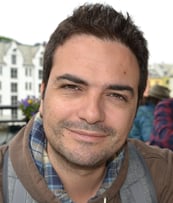Career Perspectives: Interview with Benjamin Esterni, Principal Biostatistician

At Cytel we believe that expert statistical input has the power to shape the future of clinical development: de-risking portfolios, accelerating timelines, and increasing the probability of success.
In this blog we talk to Benjamin who lives in France, to find out more about his career path, achievements, current role at Cytel and his interests outside of work.
 How did you identify Statistics as the right career for you?
How did you identify Statistics as the right career for you?
I attended the University Grenoble Alpes (UGA) in France to study Mathematics, and during the first lesson in applied mathematics I could suddenly see concrete applications. I was interested in learning statistics, because I found it very exciting to estimate a result for which we can’t know or calculate the exact value, and then use such estimates to take a decision or solve problems. I also like the sincerity that inherits any statistical approach: each result is systematically associated with an amount of confidence.
What does a Principal Biostatistician do?
I am a Statistician and play a key role in clinical development plans. This can be done through formal clinical trials, but also through exploratory analyses. I need to choose the best methodology to collect and analyze the data. I write detailed specifications about how to analyze and report the results, ensuring alignment of the outputs and the objectives of the project. As a lead biostatistician at project level, I’m usually the main point of contact for our clients.
What has been your journey to your current role at Cytel?
I started my career in a cancer hospital looking at oncology, I was the first biostatistician that was not a physician to join this department – this was quite rare in France at the time. This was the perfect place to learn about clinical research, here I could have easy access to the patient records and also access to physicians and biologists who were all based on the same site. This created easy connections between people and it accelerated the process for collaboration.
The next stage in my career was joining a Biotechnology company in Paris, this opportunity allowed me to work on other therapeutic areas like inflammatory and neurodegenerative diseases. I was asked to implement adaptive clinical trial designs, in particular, integrating sample size re-estimation, in case of an interim result that is lower than expected but still promising. An important component of my preparations was wider reading, this was really where I learned about the pioneering work Cytel does in the field. Cytel was a natural choice for me as my next career move.
What challenges do companies face when implementing adaptive trials?
I think the first challenge is to accept the idea that we cannot adapt everything. Adaptive designs can provide amazing improvements by giving more flexibility and efficiency or by saving previous time in clinical development. However, there are also many situations where the gain you can potentially make is nominal compared to the additional cost. Before implementing an adaptive strategy, it is important to properly estimate the balance between additional gains and costs.
Secondly, if a demonstration is made that there is some potential, the statistical challenges could appear when implementing the adaptive features. Often the relevant statistical methods are well described in the literature, but they are not always implemented at the software level, this then requires the companies to ensure they have a good level of statistical skills in order to correctly apply them.
What would be your two top tips for early career statistician looking to develop in this field?
- Take the time to understand the disease you are working on because learning the characteristics of the diseases is not only an intellectual enrichment, but it’s also essential to choose the correct methodology. It makes the collaboration easier with medical teams.
- Learn about data simulations, give it some dedicated time, this is a really good skill to have and can open doors to new possibilities.
What are your personal values?
I am always an optimistic person. There is a well-used expression in France that resonates well with me – “The glass is always half full”. If my glass is half full, my general approach is to top it with a good French red wine!
What are your main interests outside of work?
I have a passion for the Violin, I play in the local orchestra and we share our love of music with the local community by running a series of concerts through the year.
I like to travel with my family, last year we exchanged houses with a Norwegian family and spent delightful three weeks exploring.

Thank you for taking the time to talk to us and sharing your journey.
Careers
Cytel biostatisticians and programmers are active and well regarded in industry associations and communities around the world. Would you like to join our talented team? We have roles for statistical programmers at all levels across our global locations. To find out more about rewarding careers with us click below.


